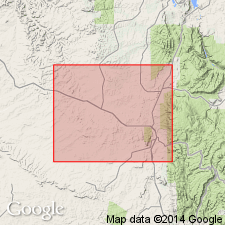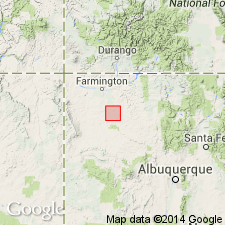
- Usage in publication:
-
- Nacimiento group*
- Modifications:
-
- Named
- Dominant lithology:
-
- Sandstone
- Shale
- AAPG geologic province:
-
- San Juan basin
Summary:
Named for town of Nacimiento (called Cuba by PO) at foot of Nacimiento Mountains (type locality), Sandoval Co, NM, San Juan basin. Typical section 834 ft thick measured along Puerco River south and west of Nacimiento measured where group unconformably overlies Lewis shale or "Laramie sandstone", unconformably underlies Wasatch formation, and is divided into Puerco formation (base) 558 ft thick, and unconformably? overlying Torrejon formation (top) 276 ft thick. Underlying Laramie has coal and different strike of beds than Puerco. Wasatch has basal conglomerate of chert, quartz pebbles and crystalline rocks. Puerco consists of gray, variegated, yellowish shale and massive, brown to yellowish sandstone. Some shale beds are carbonaceous. Some sandstone beds are coarse grained, lenticular. Torrejon consists of gray shale and tan, gray, yellowish, variegated, soft, massive sandstone. Conglomerate layers locally in both formations. Formations not easily separated without fossil evidence. Second section measured on east fork of Arroyo Torrejon, 4 mi east of Farmington road where group is divided into Puerco 210 ft thick, and unconformably overlying Torrejon 140 ft thick. Neither formation recognized outside northeast NM. Deposited in deltas, lagoons, and shallow freshwater lakes on a peneplaned surface. Fossils: mammals multituberculates, creodonts, insectivores, reptiles, birds, mollusks, floras (listed). Considered Eocene.
Source: GNU records (USGS DDS-6; Denver GNULEX).

- Usage in publication:
-
- Nacimiento Formation*
- Modifications:
-
- Overview
- AAPG geologic province:
-
- San Juan basin
Summary:
Overlies and intertongues with, in the western San Juan basin, NM, the Ojo Alamo Sandstone, a unit that is restricted in this report to the cuesta-forming, coarse-grained, conglomeratic, arkosic sandstone. Includes a Puerco and Torrejon fauna. Assigned to the Paleocene. Cross section. Geologic map.
Source: GNU records (USGS DDS-6; Denver GNULEX).
For more information, please contact Nancy Stamm, Geologic Names Committee Secretary.
Asterisk (*) indicates published by U.S. Geological Survey authors.
"No current usage" (†) implies that a name has been abandoned or has fallen into disuse. Former usage and, if known, replacement name given in parentheses ( ).
Slash (/) indicates name conflicts with nomenclatural guidelines (CSN, 1933; ACSN, 1961, 1970; NACSN, 1983, 2005, 2021). May be explained within brackets ([ ]).

